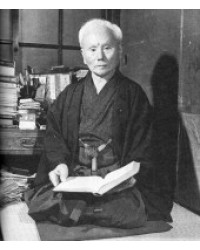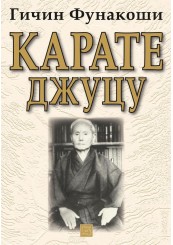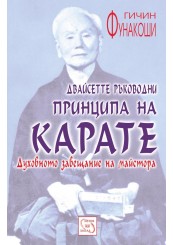Gichin Funakoshi

Gichin Funakoshi (1868–1957) is the founder of Shotokan Karate-Do, perhaps the most widely known style of karate, and is attributed as being the "father of modern karate". Following the teachings of Anko Itosuand Anko Asato, he was one of the Okinawan karate masters who introduced karate to the Japanese mainland in 1922. He taught karate at various Japanese universities and became honorary head of the Japan Karate Association upon its establishment in 1949.
Gichin Funakoshi was born on November 10, 1868 (refer to Karate-dō, My Way of Life by Gichin Funakoshi), the year of the Meiji Restoration, in Shuri, Okinawa, to a low-rank Ryūkyūan Pechin and originally had the family name Tominakoshi. Funakoshi was born prematurely. His father's name was Gisu. After entering primary school he became close friends with the son of Ankō Asato, a karate and Jigen-ryū master who would soon become his first karate teacher. − Funakoshi's family was stiffly opposed to the abolition of the Japanese topknot, and this meant he would be ineligible to pursue his goal of attending medical school, despite having passed the entrance examination. Being trained in both classical Chinese and Japanese philosophies and teachings, Funakoshi became an assistant teacher in Okinawa. During this time, his relations with the Asato family grew and he began nightly travels to the Asato family residence to receive karate instruction from Ankō Asato.
Funakoshi had trained in both of the popular styles of Okinawan karate of the time: Shōrei-ryū and Shōrin-ryū. Shotokan is named after Funakoshi's pen name, Shōtō, which means "waving pines". Kan means training hall, or house, thus Shōtōkan referred to the "house of Shōtō". This name was coined by Funakoshi's students when they posted a sign above the entrance of the hall at which Funakoshi taught reading "Shōtō kan". In addition to being a karate master, Funakoshi was an avid poet and philosopher who would reportedly go for long walks in the forest where he would meditate and write his poetry.
By the late 1910s, Funakoshi had many students, of which a few were deemed capable of passing on their master's teachings. Continuing his effort to garner widespread interest in Okinawan karate, Funakoshi ventured to mainland Japan in 1917, and again in 1922.
In 1930, Funakoshi established an association named Dai-Nihon Karate-do Kenkyukai to promote communication and information exchange among people who study karate-dō. In 1936, Dai-Nippon Karate-do Kenkyukai changed its name to Dai-Nippon Karate-do Shoto-kai. The association is known today as Shotokai, and is the official keeper of Funakoshi's karate heritage.
In 1936, Funakoshi built the first Shōtōkan dojo (training hall) in Tokyo. He changed the name of karate to mean "empty hand" instead of "China hand" as it was referred to in Okinawa; the two words sound the same in Japanese. It was his belief that using the term for "Chinese" (literally Tang dynasty) would mislead people into thinking karate originated with Chinese boxing. Karate had borrowed many aspects from Chinese boxing which the original creators say as being positive, as they had done with other martial arts. In addition, Funakoshi argued in his autobiography that a philosophical evaluation of the use of "empty" seemed to fit as it implied a way which was not tethered to any other physical object.
Funakoshi's interpretation of the character kara in karate to mean "empty" rather than "Chinese" was reported to have caused some recoil in Okinawa, prompting Funakoshi to remain in Tokyo indefinitely. In 1949 Funakoshi's students created the Japan Karate Association (JKA), with Funakoshi as the honorary head of the organization. However, in practise this organization was led by Masatoshi Nakayama. The JKA began formalizing Funakoshi's teachings. Funakoshi was not supportive of all of the changes that the JKA eventually made to his karate style. Funakoshi got osteoarthritis in 1948 and died of colorectal cancer in 1957.
€4.09 (8.00 лв.)Ex Tax: €3.75 (7.34 лв.)



